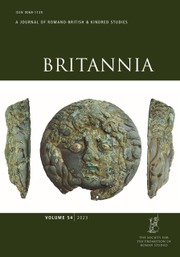Article contents
The Case of the Redundant Official
Published online by Cambridge University Press: 09 November 2011
Extract
Professor C. Northcote Parkinson has demonstrated that government officials increase by a process of quasi-organic growth, unrelated to the burden of work for which they are responsible. The phenomenon is as apparent in the Roman Empire as in modern Britain; but modern British scholarship working on the evidence from the Roman Empire has carried the process even further by producing an official who never existed - though in fairness it must be admitted that no new post was created. It would be interesting and instructive to follow the process by which this apocryphal administrator became accepted into the canon of governors of Roman Britain, but problems of space mean that we can do no more than show why he must be declared redundant.
- Type
- Articles
- Information
- Copyright
- Copyright © Michael G. Jarrett 1978. Exclusive Licence to Publish: The Society for the Promotion of Roman Studies
References
1 RIC 437, 440; coins of 185 and 186 repeat the themes. Presumably victory had been achieved by 183.
2 Arch. Ael. 4 xvi (1939), 243–4.Google Scholar
3 Jarrett, M. G., Maryport, Cumbria: a Roman fort and its garrison, Kendal 1976, 10–12.Google Scholar
4 Arch. Ael. 4 xix (1941), 37–9.Google Scholar
5 Birley, A. R., Epig. Stud. iv (1967), 75, no. 32Google Scholar; Jarrett, M. G. and Mann, J. C., Bonner Jb. clxx (1970), 192–3.Google Scholar
6 Chiron vi (1976), 358–380, especially 367-372.Google Scholar
7 Historia xxiv (1975), 475.Google Scholar
8 S. S. Frere, Britannia (ed. 2, 1974), 195.
- 1
- Cited by


